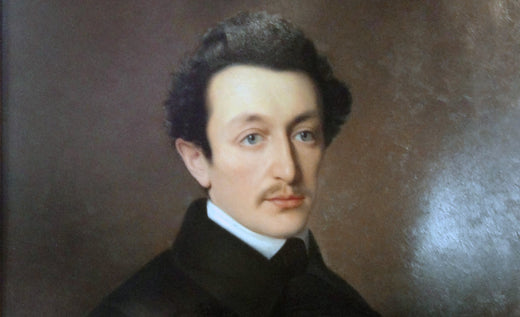Name: Moses Hess (1812-1875)
Category: Insider
Known for: German-J*wish ideological leader of the nascent Zionist movement in Europe in the late 1800s; worked with both Communists and Zionists (both of which were growing J*wish revolutionary movements in the late 19th century); nicknamed "the Communist Rabbi."
Notable works: Rome and Jerusalem: The Last National Question (1862)
Moses Hess is categorized as a "philospher" in the mainstream; but if he was a philosopher, then so were Karl Marx and Vladimir Lenin. Hess's work was not about contemplation or thought experimentation; it was about implementing communism in Europe and establishing a Jewish state. Hess was both a Communist and a Zionist, which was unusual at the time since most politically active J*ws were either one or the other.
Hess was a colleague of Karl Marx and Friedrich Engels, and actually worked to refine Engels' theories of communism. He was also an influence on the infamous Theodor Herzl, the highest-level ideologue and political leader of the Zionist movement when it peaked in its political activity in the late 1800s.
Hess's best known book, Rome and Jerusalem, is presented as a collection of letters to colleagues in the movement, addressing various topics germane to the "J*wish Question" (which J*ws were asking themselves about as much as Europeans were in the latter half of the 1800s.) He discusses a number of topics, but waxes poetic frequently, goes off topic, and wavers between seemingly contradictory positions often.
Nevertheless, Rome and Jerusalem, published in 1862, gives great insight into the mindset of a J*wish thought leader in both the Zionist and Communist movements, and there are many useful quotes to be taken from his work, most notably regarding the common (but well hidden) sentiment of "Jewish supremacy."
Among them are:
"...if Moses and the Prophets had believed in a life beyond the grave, in the Christian sense, they would have stated the fact as explicitly as did the writers of the New Testament...I do not deny that there is no mention of immortality in the Old Testament." (p. 50)
"The J*wish race is one of the primary races of mankind that has maintained its integrity, in spite of the continual change of its climactic environment, and the Jewish type has conserved its purity throughout the centuries." (p. 59)
"If J*d*ism owes its immortality to the remarkable religious productivity of the J*wish genius, this genius itself owes its existence to the fertility of the J*wish race." (p.60)
"As long as the J*w submitted in silence to persecution and disgrace, considering it a punishment of God, all the time confidently hoping for the future restoration of his nation, his pride was not impaired. His only care was to enable his race to reach that glorious future which would amply recompense it for all the suffering it had undergone in the past, when God will mete out punishment to the persecutors and enemies of Israel." (p. 73)
"Christianity is, after all, a religion of death, the function of which ceased the moment the nations reawakened into life." (p. 76)
"There are two epochs that mark the development of J*wish law; the first, after the liberation from Egypt; the second, after the return from Babylonia. The third is yet to come, with the redemption from the third exile." (p. 103)
"As long as no other people possessed such a national, humanitarian cult, the J*ws alone were the people of God. Since the French Revolution, the French, as well as the other peoples which followed them, have become our noble rivals and faithful allies." (p. 120)
Above all, Moses Hess' work proves unequivocally that communism was an ideology with J*wish origins and permeated with a distinctly J*wish character, whcih led later to the shocking horrors of the Bolshevik Revolution.
That communism was a J*wish innovation was abundantly clear in the published work of many J*wish communists who were actually proud of that achievement (most notably Karl Marx); however, after WW2 and the Holocaust, that is seemingly entirely written out of history books, and is very little known today.

